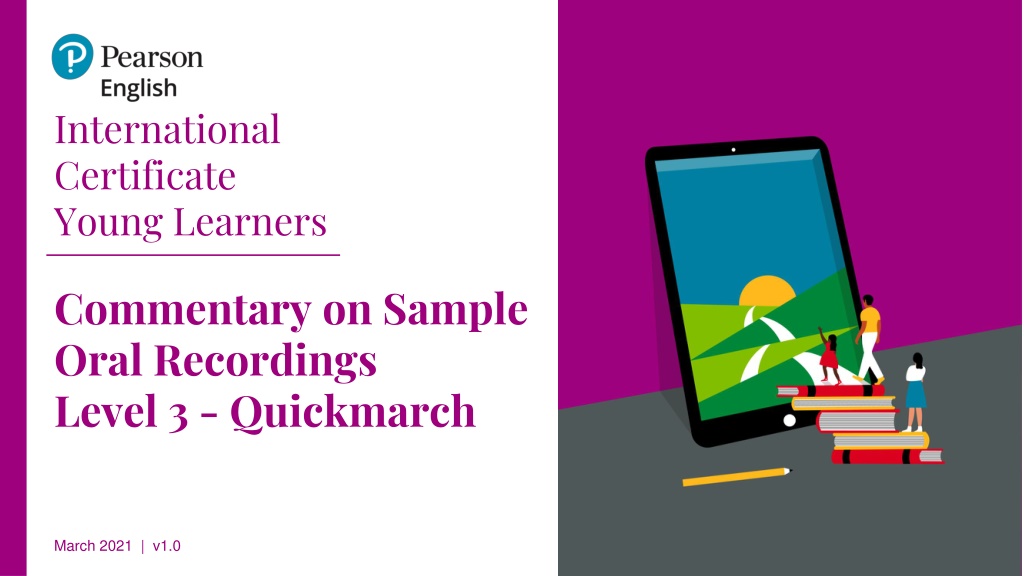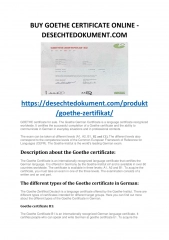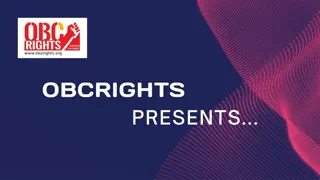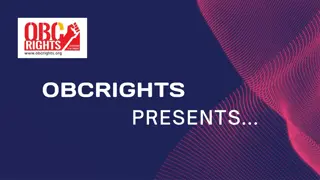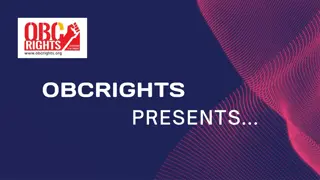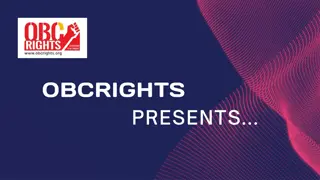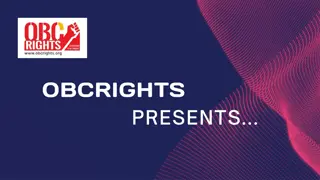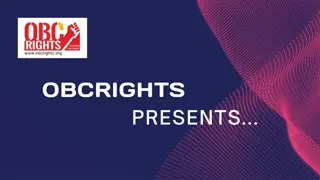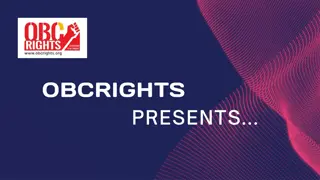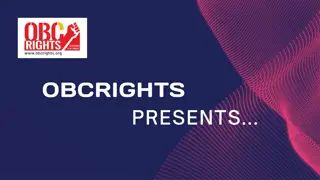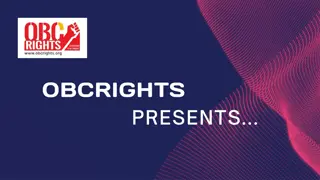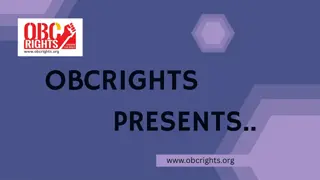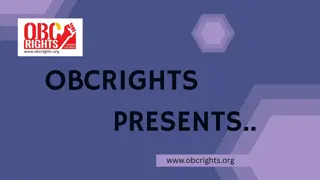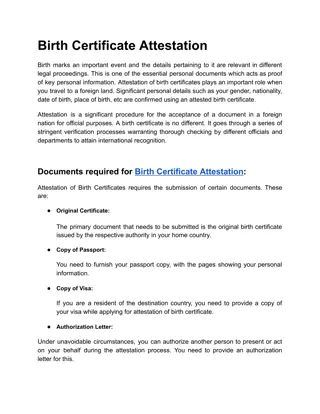Guidelines for Assessing International Certificate Young Learners Oral Tests - Level 3
This document provides guidance on assessing International Certificate Young Learners' oral performance at Level 3. It includes criteria for assessment related to grammar, vocabulary usage, and pronunciation, with detailed descriptions and scoring for each level of proficiency. Test takers are evaluated based on their range of vocabulary, grammar accuracy, and pronunciation clarity. The document emphasizes the importance of considering the test taker's proficiency level and referencing the syllabus for relevant language content information.
Download Presentation

Please find below an Image/Link to download the presentation.
The content on the website is provided AS IS for your information and personal use only. It may not be sold, licensed, or shared on other websites without obtaining consent from the author. Download presentation by click this link. If you encounter any issues during the download, it is possible that the publisher has removed the file from their server.
E N D
Presentation Transcript
International Certificate Young Learners Commentary on Sample Oral Recordings Level 3 - Quickmarch March 2021 | v1.0
This document has been prepared to give you guidance on assessing International Certificate YL oral tests. It is accompanied by a sample recording
How to assess the oral performance Award up to five points/marks for usage of grammar and vocabulary and up to five points/marks for pronunciation based on the Criteria for Assessment. Award the number of marks given for the description which most closely fits the test taker in question. Always bear in mind the IC YL level at which the test taker is being tested and refer to the sylabus (Language Content) for information regarding grammar and expected vocabulary knowledge for the level. The sylabus is a part of Level Guides that are available online.
Criteria for Assessment Grammar and vocabulary usage 5 marks Test taker has an excellent range of both vocabulary and grammar used accurately and appropriately. Errors are rare and found only in low frequency lexis and when using more complex grammatical forms. 4 marks Test taker has good lexical and grammatical range but there may be occasional errors. It may be that grammar or vocabulary is a little weak but that the other compensates. Errors do not impede understanding. 3 marks Errors in both grammar and vocabulary are evident but the test taker has enough knowledge in these areas to communicate and there is little need for clarification. 2 marks Despite occasional good usage, grammar and vocabulary choice is frequently incorrect and this causes problems for the listeners as well as misunderstandings. 1 mark Although the test taker has demonstrated knowledge of individual items of vocabulary and some grammar, these are so limited that only rarely is real communication possible 0 mark No useful knowledge of grammar or vocabulary at the required level.
Criteria for Assessment Pronunciation 5 marks Test taker has excellent pronunciation, demonstrating awareness of intonation patterns required for asking questions, as well as of sentence, word stress, and individual sounds. 4 marks Test taker has good pronunciation, which can be readily understood by listeners despite some lapses in pronouncing individual words and problems with stress and intonation. 3 marks There are some mispronunciations at word and sentence levels but in general listeners do not have any great problems understanding. It may be that repetition is needed on occasion. 2 marks Frequent errors in various aspects of pronunciation make the speaker difficult to understand/result in misunderstanding, and/or make it necessary for listeners to ask for repetition. 1 mark Although the test taker utterances can be recognised as English, they are so difficult to follow that communication breaks down. 0 mark Pronunciation is not recognised as English discourse.
Language Content Quickmarch In addition to the language included at Firstwords and Springboard, the following list represents the types of language content that are typically assessed at this level including areas of language use, main structures, topics and vocabulary. Structures and vocabulary given in italics are for guidance only and are not intended to be a complete list. Areas of Language Use Talk and ask about sports and hobbies Talk and ask about everyday activities Talk and ask about countries, cities, towns, shops and buildings Talk and ask about modes of transport and journeys Order food in a restaurant Talk about past events Understand, ask and answer questions about a story Understand a simple story Talk about future plans Tell the time (hours and minutes) Topics Spare Time Time Places Jobs Illness Topics included at lower levels may also be reused and developed. Clothes Food Description of Animals Homes Families Pets and Animals School The Body and People s Appearance Toys Houses
Language Content Quickmarch Main Structures Past tense of to be Was, were The simple past tense walked. I didn t walk. Did you walk? Irregular past forms of common verbs went, got up, ate, drank, slept, came Going to to express future plans and intentions I am going to visit my aunt next week. I am going to work hard this year. Present continuous for future use She s going out tonight. Can for permission Can we go to the cinema? Comparatives of adjectives Ben is older than Sophie. Ben is better at English than Sophie. Superlatives of adjectives Anna is the youngest girl in her class. Conjunction because Billy was late for school because he missed the bus.
Language Content Quickmarch Vocabulary Common spare time activities swimming, dancing, playing computer games Hobbies collecting stamps or teddy bears, solving puzzles Common jobs and professions teacher, doctor, police officer, taxi driver, nurse Common illnesses which affect children headache, toothache, sore throat Names of countries and nationalities France, French, China, Chinese, Canada, Canadian Points of the compass north, south, east and west Basic geographical features river, mountain, sea, lake Town facilities museum, cinema, supermarket, library Shops and essential shopping items bakers, bread, chemist s, medicine, newsagent s, newspaper
Overall Guidelines for Assessment When should 5 marks be given 5 marks should be given to candidates whose range of grammar and vocabulary is really good AND used accurately. Ariel (Quickmarch) is given five for her expansion in the board game but only four because of her grammar errors in the short talks. 5 marks for pronunciation means no problems at all for listeners AND very natural stress and intonation patterns again like Ariel. When should 4 marks be given Don t expect very long answers, especially at lower levels. 4 marks should be given for answers which are correct, use the proper verb form but may be short Yes/No answers are not worth a 4, even if correct One short answer and one longer answer may be a 4 depending on the content In pronunciation, a flat delivery which is comprehensible will probably be a 3. To get a 4 in pronunciation, there should be some evidence of stress and intonation (e.g. Olga Firstwords)
Overall Guidelines for Assessment When should 3 marks be given Remember 3 marks is adequate. When the candidate can be understood, even if the grammar and vocabulary are not very good, a mark of 3 should be awarded rather than 2 Also true for pronunciation, if a candidate can be understood more than NOT understood, at least 3 marks should be awarded Look for positive achievement, rather than errors When should 2 marks be given A mark of 2 indicates there are frequent errors (grammatical, lexical or pronunciation); compare to see if there are more frequently good examples than bad. Note that candidates who speak more usually make more mistakes, too. Listen for their good usage and ability to communicate before giving a 2 Long hesitations and need for prompting from the examiner, followed by very short answers could take the score down to two for grammar. When should 1 mark be given One mark is only given for very poor performance, limited to isolated words most of the time.
Overall Guidelines for Assessment Overall comments There will be more evidence in the Short Talks. Candidates need to ask questions as well as give a short talk. If they speak badly in the short talk but compensate for this in asking questions, they could be marked with a 3. If candidates answers often don t make sense, they cannot get a 3. 3 s are for comprehensible most of the time (even with mistakes) Because of the nature of the board game, some candidates will not have to say much. Candidates who always answer with very short answers will not get very high marks.
Level 3 Quickmarch Commentary on Sample Recordings
ARIEL VOCAB./GRAMMAR PRONUNCIATION BOARD GAME 5 5 SHORT TALK 4 5 GAME: Ariel s performance was very good. Despite a rather short, but nevertheless very appropriate answer About 10 minutes , for her second response, her expansion in the first, using language of the level, more than compensated for this I like beef best. I think it s healthy and tasty . Her pronunciation was also very good and natural sounding and as well as using good sentence stress, she showed awareness of the intonation patterns required to ask questions. TALK: When talking about her last birthday, Ariel used a lot of appropriate structures but sometimes tried to use language above the level and as a result, there were a few non-intrusive grammar errors (present instead of past) I get a book I tell a friend . Her pronunciation was of a very high level and she sometimes used it to express feelings.
KITTY Wu VOCAB./GRAMMAR PRONUNCIATION BOARD GAME 4 4 SHORT TALK 3 4 GAME: Kitty s performance was good and she answered both her questions promptly and appropriately. She asked and answered her questions clearly with good pronunciation, causing no problems at all for listeners. TALK: Kitty s talk about cars, buses and trains contained erratic tense usage and there were some problems with subject-verb agreement trains was . At the same time Kitty handled questions using a variety of Quickmarch structures well, although she did ask Dick a question in the present rather than the past. Her pronunciation continued to be at a good level.
DICK VOCAB./GRAMMAR PRONUNCIATION BOARD GAME 4 3 SHORT TALK 2 3 GAME: Dick answered one of his questions using a slightly flawed future form and the other with a full sentence describing the jobs of his parents. His contributions were effective and readily comprehensible. His response to Where are you going to go at the weekend? was I going to study English. This was an acceptable response as going to a language school on a Saturday is not an unusual thing. His pronunciation was adequate but contained some minor mispronunciations involving the s sound. TALK: Dick did not take advantage of the opportunity to use past tenses and he spoke irrelevantly for much of the time focusing on his school rather than Yesterday . Even when the examiner intervened, he did not use past forms. His questions were not really at Quickmarch level so his mark was kept to two. His pronunciation was faltering at times but quite comprehensible despite some mispronunciations with very pronounced as wery for instance..
JACK VOCAB./GRAMMAR PRONUNCIATION BOARD GAME 3 3 SHORT TALK 3 2 GAME: Jack was unable to use language of the level effectively and made some low level errors including about two park in my town and using the Simple Present for the future. Despite this he was comprehensible. His pronunciation was also comprehensible although there were some minor mispronunciations best was not enunciated well. TALK: There was not a great range of Quickmarch language in this part of the exam and although there was evidence of good vocabulary usage when describing a friend outgoing , there were errors evident too We are both like this sport . There was some strain on the listener as regards pronunciation of individual sounds and pronunciation of 13 sounded like 30. Comprehensibility broke down somewhat at one point.
KITTY Ho VOCAB./GRAMMAR PRONUNCIATION BOARD GAME 4 4 SHORT TALK 2 3 GAME: Kitty s performance was good as she answered both her questions accurately and appropriately. She used the impersonal; it well also and her pronunciation was readily understood. TALK: Kitty s short talk was not really on subject and she focused on cities rather than The biggest city in my country . Because of this she became confused and her language usage was erratic with expressions such as My city is big country is .. . At the end, the examiner had to check that Kitty had understood the prompt. There was no real flow to her pronunciation, though listeners were able to make out what was being said.
